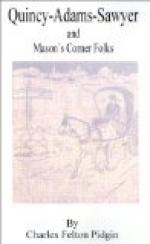“That’s so,” assented the Deacon. “Well, I’ve got to get home, cuz I promised to meet him by twelve o’clock.”
“So have I,” said Quincy, “for I have got to see the man who is going to buy the grocery store and fix up a few business matters with him.”
Both men left the bank and got into their respective teams, which were standing in front of the building.
“Which road are you going, Deacon?” asked Quincy.
“Waal, I guess, for appearance’s sake, Mr. Sawyer, you better go on the straight road, while I’ll take the curved one. Yer know the curved one leads right up to my barn door.”
“Yes, I know,” said Quincy, “I found that out last night;” and the two men parted.
Quincy made quick time on his homeward trip. As he neared the Pettengill house he saw Cobb’s twins and Hiram standing in front of the barn. He drove up and threw the reins to Bill Cobb, saying, “I shall want the team again right after dinner;” and turning to Hiram, be said, “Come down to Jacob’s Parlor, I want to have a little talk with you.”
They entered the large wood shed that Ezekiel’s father had called by the quaint name just referred to, and took their old seats, Quincy in the armchair and Hiram on the chopping block facing him. Hiram looked towards the stove and Quincy said, “It is not very cold this morning, I don’t think we shall need a fire; besides, what I have got to say will take but a short time. Now, young man,” continued he, “how old did you say you were?”
“I am about thirty,” replied Hiram.
“You are about thirty?” repeated Quincy, “and yet you are satisfied to stay with Deacon Mason and do his odd jobs for about ten dollars a month and your board, I suppose.”
“Well, he isn’t a mean man,” said Hiram, “he gives me ten dollars a month and my board, and two suits of clothes a year, including shoes and hats.”
“Have you no ambition to do any better?” asked Quincy.
“Ambition?” cried Hiram, “why I’m full of it. I’ve thought of more than a dozen different kinds of business that I would like to go into and work day and night to make my fortune, but what can a feller do if he hasn’t any capital and hasn’t got any backer?”
“Well, the best thing that you can do, Hiram, is to find a partner; that’s what people do when they have no money; they look around and find somebody who has.”
“You mean,” said Hiram, “that I’ve got to look ’round and find some one who has got some money, who’s willin’ to let me have part of it. There’s lots of fellers in Eastborough that have got money, but they hang to it tighter’n the bark to a tree.”
“And yet,” said Quincy, “a man like Obadiah Strout can go around this town and get parties to back him up to the extent of twenty-five hundred dollars.”
“Yes, I know,” answered Hiram, “but he couldn’t do that if the parties didn’t have a mortgage on the place, and o’ course if Strout can’t keep up his payments they’ll grab the store and get the hull business. I happen to know that one of the parties that’s goin’ to put his name on one of Strout’s notes said quietly to another party that told a feller that I heerd it from that it wouldn’t be more’n a year afore he’d be runnin’ that grocery store himself.”




